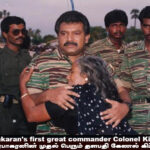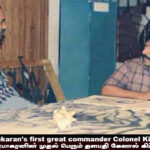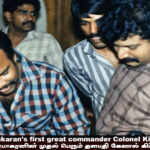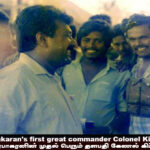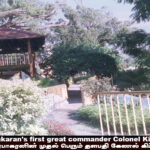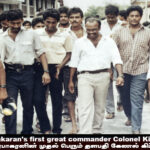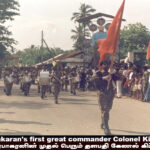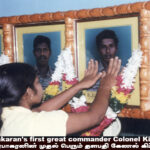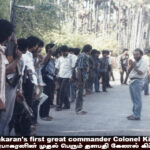

Prabhakaran’s first great commander Colonel Kittu..
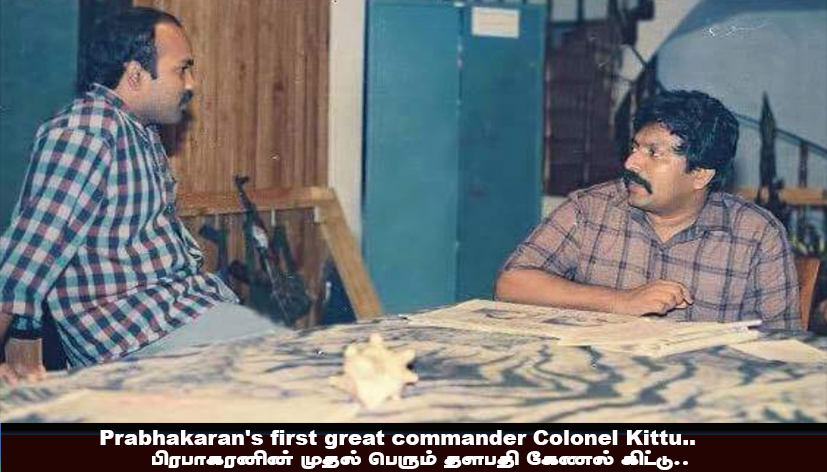
Colonel Kittu
(January 2, 1961 – January 16, 1993)
Sathasivam Krishnakumar
He joined the Tamil Eelam Liberation Struggle in 1979 at the age of eighteen. Renamed to Vengittu, he was fondly called Kittu by his friends.
History of Struggle
It has been 26 years since the sacrificial fire burned and went out in the middle of the Bay of Bengal but the Tamil people’s minds are still burning with the thought of it. Colonel Kittu and the nine companions who came with him were burnt to death and drowned in the Bay of Bengal. That incident is not only a death that history will not forget, but it has become a wave that refuses to leave our hearts and has been fixed in our memories.
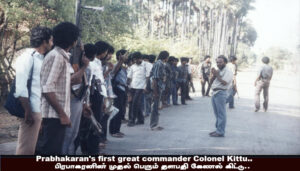 In 1979, during the foundation of the early Tamil Eelam liberation struggle, an eighteen-year-old boy named Sathasivam Krishnakumar turned himself into a freedom fighter and changed his name to Vengittu, later affectionately known as Kittu by his comrades. Kittu and some other comrades learned the art of war from the leader himself. Kittu’s dynamism and speed set him apart from the crowd.
In 1979, during the foundation of the early Tamil Eelam liberation struggle, an eighteen-year-old boy named Sathasivam Krishnakumar turned himself into a freedom fighter and changed his name to Vengittu, later affectionately known as Kittu by his comrades. Kittu and some other comrades learned the art of war from the leader himself. Kittu’s dynamism and speed set him apart from the crowd.
Since Kittu had the natural ability to learn anything quickly and efficiently, Kittu, who was always beside the leader, knows the leader’s thoughts and the boundless affection he had for the people. His speed and prudence, combined with his extraordinary skill have given rise to a certain confidence in him. Kittu waits for the time to prove the leader’s faith in him. He received direct military training from LTTE leader Velupillai Prabhakaran.
On the 4th of March 1983, a team of LTTE members led by Adputhan headed to Umaiyalpuram for an offensive. Kittu was part of the team and the field of attack was determined. They planted landmines on the road and are waiting for the arrival of the enemy. It was a time when the LTTE did not have enough capability to deal with landmines. As the military vehicles approached the target, the LTTE were thrown into disarray when a flock of lamb crossed the path of the enemy and ran away in terror at the sight of the emergency vehicles and detonated eye grenades.
As two army armored vehicles approached the militants with guns blazing, they had no choice but to retreat. But Kittu alone, not considering the unfavorable terrain facing the enemy, stood bravely and fired with his G3 gun and broke the military shield. He didn’t miss the target. The driver was injured and the vehicle started moving. Kittu left the field happy to have fulfilled the leader’s faith. His very first engagement starts as a key personal achievement.
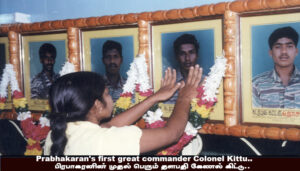
On April 7th, 1983, Kittu was promoted to second in charge in the LTTE’s attack squad. After this, in order to reject the local government elections imposed by the Sri Lankan government, he participated in the attack on the army at Kandarmadam polling station and the detonation of the Thirunelveli landmine on military vehicles on July 23rd. Kittu is appointed as the second in charge of the first group of the movement that went for training on Indian soil approaching the year end of 1983.
Kittu returned to Tamil Eelam after completing his training and played an important role in various attacks including the Kurunagar army camp attack on March 2nd, 1984. Following Jaffna Captain Pandithar’s “veerachavu” (a hero’s death) on the 9th January 1985 in a clash with the enemy, Colonel Kittu was appointed the role of the district commander fulfilling the duties of the late Captain. After becoming the District Commander of Jaffna, in his command he handled the attack on the Jaffna Police station and seized a large quantity of weapons from there.
Not only in the minds of the people of Tamil Eelam, all the Tamil relatives living across the border were proud of Kittu’s heroic achievements. On November 10, 1986, in connection with the release of two Sinhalese soldiers held captive by the LTTE in Mannar, the name Kittu became popular among the Sinhalese people when he took the Sinhalese Army Commander Colonel Ananda Weerasekhara and Captain Kothalavalan to his place.
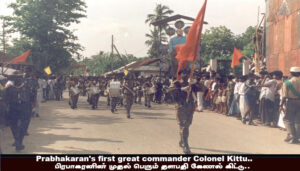 Kittu’s successful raids in the Jaffna district continued. All the enemy camps were isolated and frozen from movement with Kittu’s efforts. The Sri Lankan army occupying the fort panicked when they heard the name Kittu. Among the people, the three-syllable name Kittu is chanted like a mantra. He not only defeated the enemy on the ground, he was winning the hearts of the people.
Kittu’s successful raids in the Jaffna district continued. All the enemy camps were isolated and frozen from movement with Kittu’s efforts. The Sri Lankan army occupying the fort panicked when they heard the name Kittu. Among the people, the three-syllable name Kittu is chanted like a mantra. He not only defeated the enemy on the ground, he was winning the hearts of the people.
Having lost his left leg in a grenade attack by a traitor at the end of March 1987, Kittu was growing into a force for liberation war with the same speed and determination as before. Kittu went to India for his treatment during the India-Sri Lanka Treaty when the treaty was broken, and he worked hard to expose the true nature of the war imposed by the Indian government. He met many Indian political leaders, journalists, artists, professors and discussed our position. He brought our stories of martyrdom to the eyes of the people of India through many publications.
The Indian Army was slowly losing its face. Tamil Eelam taught India what Vietnam taught America and what Afghanistan taught Soviet Union. In this case, the Sri Lankan government rejected India and offered to talk with the LTTE.
In this situation Kittu was kept under house arrest by the Government of India and in the Central Jail, Chennai. While in jail, he wrote a long series of articles on the struggle for the Devi magazine published in Tamil Nadu. Fearing protests, the Indian government freed him from Prison and back to Tamil Eelam. The freed Kittu made way to Vanni, met the leader in the forest and fought the war against the Indian army till the end.
The “Veerachavu” (A Hero’s Death) of Colonel Kittu
In 1989, Kittu, who was part of the team that went to Colombo to talk to the Sri Lankan government, went to London while in charge of the LTTE’s foreign wing. While returning to Tamil Eelam in the ship MV Agath, 10 people including Lieutenant Colonel Kuttisiri and Colonel Kittu, with the peace message of ‘Quakers’, surrounded and destroyed by the Indian Navy.
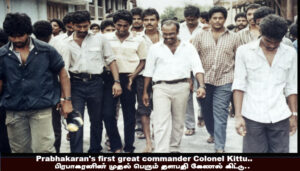 During his time in London, Kittu instilled a sense of hope among the diaspora Tamils. He brought the happenings in Eelam to the people through various magazines like ‘Kalathil’ and ‘Erimalai’. He also established and worked in various organizations abroad such as LTTE Student Organization, LTTE Art and Culture Club.
During his time in London, Kittu instilled a sense of hope among the diaspora Tamils. He brought the happenings in Eelam to the people through various magazines like ‘Kalathil’ and ‘Erimalai’. He also established and worked in various organizations abroad such as LTTE Student Organization, LTTE Art and Culture Club.
He expanded his activities and won the minds of the people who were displaced from the motherland, who forgot the sense of freedom and attachment to the motherland. No matter where Kittu lived or what he did, his mind revolved around the land of Tamil Eelam. He deeply loved the leader, the motherland and the Tamil people. He waited with longing to set foot in Tamil Eelam again.
As Kittu expected, he got the opportunity to go to Tamil Eelam. With the ideas of the Quakers Peace Group, Kittu and his companions traveled from a European country through international waters aboard the MV Agath. India weaves its ship in international waters where anyone can go. The Indian Navy intercepted Kittu’s ship in international waters and forcibly towed it into its territory.
All efforts were made to the Indian government about peace efforts, but they were futile. Even as they towed away MV Agath, Colonel Kittu stressed he had come on a peace-keeping mission. Just like how India had a hand in the loss of our generals like Kumarappa, Pulendran, Dileepan and Johny, India trapped the Colonel Kittu. Kittu and his nine companions who grew up in the way of a leader who thinks that his dignity is greater than life, will not bow down to the Indian government. They engaged in battle and the MV Agath was downed at sea.
After his Veerachavu (Hero’s Death)
Colonel Kitu was much loved by the national leader. He experienced his love. He shouldered the leader’s ideals and lived in harmony with his mind. To express the bond of affection between him and Colonel Kittu, the Tamil National Leader said, “I loved Kittu deeply, I loved him as a brother, as a commander, as a close companion who bore my burdens. It is beyond ordinary human affection. United in the same spirit of idealism, it is the love that developed in the deep understanding of each other in the experience we shared in the life of struggle”.
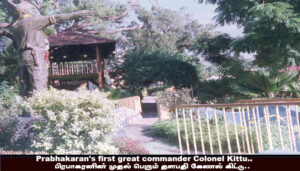 As much as Kittu is in the mind of the leader, he is also in the minds of the people of Tamil Eelam. Today, Tamil Eelam stands tall with his memories that will never be forgotten. Kittu’s historical footprints, etched since the early days of the Tamil Eelam Liberation Struggle, have evolved into an indelible record and continue.
As much as Kittu is in the mind of the leader, he is also in the minds of the people of Tamil Eelam. Today, Tamil Eelam stands tall with his memories that will never be forgotten. Kittu’s historical footprints, etched since the early days of the Tamil Eelam Liberation Struggle, have evolved into an indelible record and continue.
He was very concerned about solving people’s problems. He raised the standard of living of the people by establishing industries, libraries, cheap shops and parks. As Kittu’s social work expanded, he was perceived by the people as an incomparable fighter who reflected the thoughts of the Tamil Eelam national leader.
The loss of Kittu was a tragic event that not only crushed the soul of the leader but also the soul of every Tamil. People were wondering where they will find that great hero who was admired wholeheartedly by the people. Kittu’s loss was an indigestible blow to the people who had survived many losses.
The National Leader said, “Kittu you are not dead, you have been born a new breath”.
In today’s world, Kittu’s role has been vital in Tamil’s liberation struggle taking a massive form that no one can deny. It must be said that Kittu succeeded in uniting the Tamil people who were scattered all over the world and mobilizing them towards the liberation of Tamil Eelam. The status quo has expanded even further today and the distinction between people and LTTE has disappeared.
Even when the international community is linking the liberation struggles with terrorism and justifying its regressive action, the Tamil people all over the world continue to rise in the face of that crisis, it is because of the concept and awareness of liberation that was sown by Kittu.
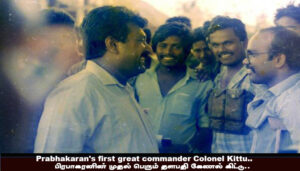 In the name of that incomparable hero who achieved great feats with small arms in those countries that operated as a guerilla system, today the largest army with heavy weapons created in the motherland of Tamil Eelam amazes the world with its achievements. With his combat finesse and fighting prowess, Colonel Kittu’s Artillery Brigade continues to leave a trail of achievements through its great successes in innumerable battlefields. Kittu’s dream is also one of the reasons why the Tamil National Army is progressing in modern warfare.
In the name of that incomparable hero who achieved great feats with small arms in those countries that operated as a guerilla system, today the largest army with heavy weapons created in the motherland of Tamil Eelam amazes the world with its achievements. With his combat finesse and fighting prowess, Colonel Kittu’s Artillery Brigade continues to leave a trail of achievements through its great successes in innumerable battlefields. Kittu’s dream is also one of the reasons why the Tamil National Army is progressing in modern warfare.
Kittu showed great concern that the true grim circumstances of the Tamil people should be exposed in the media. His intention was to pass the Sri Lankan state media and the international media that depend on them to terrorize the Tamil people’s justice struggles and tell lies to the world, and the real news should be reported to the world. These are being fulfilled today.
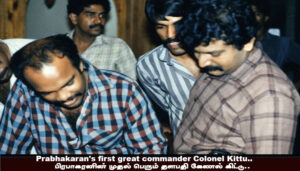 The influence of Kittu’s thoughts is also one of the reasons for the immense development of the Tamil media industry in the way that the Tamil people living in Tamil Eelam and around the world can feel the true face of their liberation struggle.
The influence of Kittu’s thoughts is also one of the reasons for the immense development of the Tamil media industry in the way that the Tamil people living in Tamil Eelam and around the world can feel the true face of their liberation struggle.
These activities are still being carried out in a state of great development in our country as a result of his extreme concern for the welfare of children, education, development, economic development, and social development. Apart from this, he dreamed of the rise of a united Tamil nation. The spirit of the Tamil people standing tall in the tight grip of the enemy is a testament to Kittu’s dream.
Kittu is living everywhere and in everything. He has an indelible place in the soul of Tamil people. Due to his boundless talents and genuine affection for the people, he left indelible memories in the Tamil community. That incomparable hero who protected the dignity of Tamils till his last breath and added pride to the leader of Tamils will never be forgotten by anyone.
“Kittu is an individual story, a record of a period in our liberation history that is raging like a long restless storm”
Let us unite with the thoughts of the national leader of Tamil Eelam and support Colonel Kittu. Let’s make a commitment on his memorial day.
Thank you Erimalai
![]()
THIS IS AN INTERESTING EVENT IN THE HISTORY OF WARFARE STUDY
